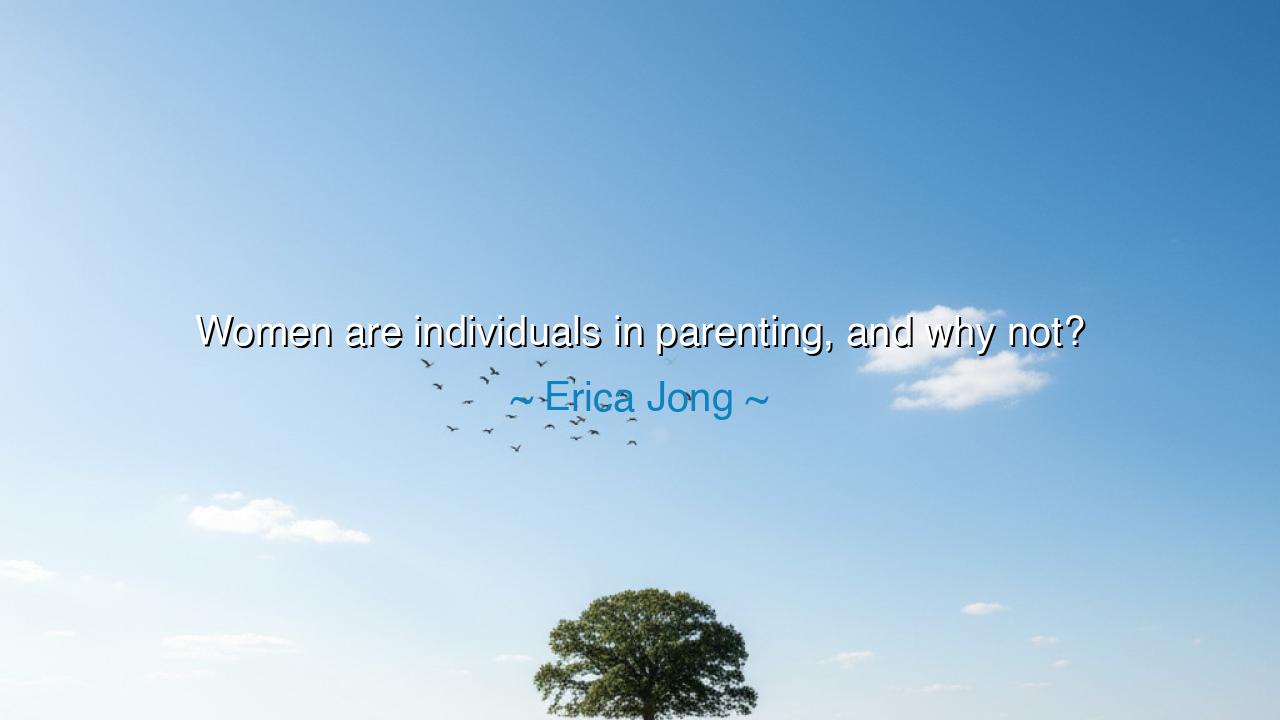
Women are individuals in parenting, and why not?






Hearken, O seekers of wisdom, to the words of Erica Jong, who illuminates a truth often overlooked in the discourse of parenting: that women are individuals, and thus each approaches the sacred labor of raising children in her own manner. She asks with clarity and force, “and why not?”—challenging the ancient and modern conventions that would impose uniformity upon the art of nurturing. In her reflection lies a profound lesson: the individuality of the guardian is not a flaw, but a source of strength, creativity, and authenticity in the formation of young lives.
The origin of this insight lies in the evolving understanding of human agency and the diversity of experience. Across generations, women have been entrusted with the care and moral guidance of children, yet their methods were often constrained by social expectation, tradition, or law. Jong’s declaration asserts a liberation of the spirit: the parenting woman is autonomous, capable of discerning her own values, rhythms, and methods in alignment with her child’s unique needs. The child, in turn, benefits from a nurturer who is fully present in mind, heart, and character.
Consider the life of Marie Curie, who navigated the dual demands of scientific discovery and motherhood. Curie’s approach to parenting was uniquely her own, shaped by intellect, resilience, and dedication to both knowledge and family. Her children, raised amidst curiosity, experimentation, and attentiveness, flourished under a maternal method that could not have been replicated by any other. Here, Jong’s truth manifests: individuality in parenting fosters both creativity and depth, enriching the child’s growth in ways rigid conformity cannot.
The emotional resonance of Jong’s statement is profound. To recognize that women are individuals in parenting is to honor their dignity, agency, and the depth of their wisdom. Each mother brings her own temperament, insight, and history to the labor of nurturing, shaping the environment in ways both subtle and profound. To impose uniformity is to diminish not only the guardian but the child, whose development thrives when met with authenticity, understanding, and responsive care.
In practical terms, Jong’s insight calls for respect, discernment, and courage. Parents must embrace their own methods, values, and instincts, trusting that their individuality is a gift rather than a liability. Historical examples, from the matriarchs chronicled in the annals of the Middle Ages to modern innovators in child development, demonstrate that children flourish most when mothers exercise wisdom tempered by authenticity. The uniqueness of the guardian informs the richness of the household and the moral and emotional education of the young.
Jong’s reflection also carries a heroic dimension: to assert one’s individuality against the currents of expectation requires courage, resilience, and clarity. Mothers must navigate societal pressures, advice, and critique, yet remain true to their own judgment and character. In doing so, they model for their children the virtues of integrity, discernment, and self-respect, illustrating that authenticity in parenting cultivates resilience, moral insight, and confidence in the next generation.
From this understanding arises a practical lesson: honor your own individuality in parenting. Reflect upon your values, temperaments, and instincts, and allow them to guide your approach to nurturing. Resist the compulsion to conform to ideals or norms that do not resonate with your experience or your child’s needs. Trust in the wisdom of lived experience, and cultivate methods that reflect your authentic self, while remaining attentive, compassionate, and present.
Thus, the teaching of Erica Jong endures: women are individuals in parenting, and why not? Let all who bear this sacred responsibility embrace the fullness of their unique selves, knowing that authenticity, courage, and discernment are the greatest gifts a guardian can offer. In honoring individuality, parents cultivate not only the growth of their children, but the flourishing of their own spirit, ensuring that the labor of care resonates with truth, love, and enduring wisdom across generations.






AAdministratorAdministrator
Welcome, honored guests. Please leave a comment, we will respond soon